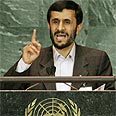
Stubborn man. Iranian President Mahmoud Ahmadinejad
צילום: רויטרס
Official: Iran will be referred to U.N.
Western diplomat tells Ynet at least 20 of the 35 member countries of U.N.’s International Atomic Energy Agency are expected to vote in favor of referring Iran to Security Council over its nuclear program
The U.N.’s International Atomic Energy Agency is expected to convene Monday in Vienna to discuss the Iranian nuclear crisis.
A Western diplomat told Ynet that at least 20 of the 35 member countries of the U.N. watchdog agency are expected to vote in favor of referring the issue to the U.N. Security Council, but added that it remains unclear whether such a vote would in fact take place on Monday.
Sources close to Foreign Minister Silvan Shalom have also said the necessary majority for the referral has been obtained. According to the sources, 18 out of the 35 member countries support this decision, while two presently remain undecided.
Britain and France, which along with Germany have led the talks with Iran until now, staunchly support the referral of Iran to the U.N.; Germany remains ambiguous in light of the current elections and an oil deal with Iran, while Russia is opposed to the move.
Western diplomats have expressed their disgruntlement with the stubbornness displayed by Iranian President Mahmoud Ahmadinejad and his unwillingness to reach a compromise regarding Iran’s nuclear aspirations.
President George W. Bush and Russian leader Vladimir Putin tried to deemphasize their differences on the matter during last weekend’s joint press conference that followed their meeting.
"I am confident that the world will see to it that Iran goes to the U.N. Security Council if it does not live up to its agreements," Bush said.
"When that referral will happen is a matter of diplomacy and that's what we talked about. We talked about how to deal with this situation diplomatically."
'Plenty of diplomatic means'
Putin said in response, “Our stance on the Iranian issue is very clear. We support all the agreements against the distribution of nuclear weapons, including Iran. We told this to the Iranian president straightforwardly during our meeting.
“We are against that Iran would become a nuclear power and will continue to do so in the future under any circumstances,” he said.
Notably, Russia is one of the five member countries of the Security Council and has the power of veto.
“There are various ways to control the situation; we will undertake all steps necessary to settle all these problems and issues, not aggravate them,” Putin said.
“We do not want our careless actions to lead to the development of events along the North Korean variant,” he told journalists, alluding to U.S. pressure on Pyongyang regarding its nuclear program.
U.S. Secretary of State Condoleezza Rice said recently that a U.S. attack on Iran "is simply not on the agenda," adding, “We believe particularly in regard to the nuclear issue that while no one ever asks the American president to take all his options, any of his options off the table, that there are plenty of diplomatic means at our disposal to get the Iranians to finally live up to their international obligations."
Diana Bahur-Nir contributed to this report










